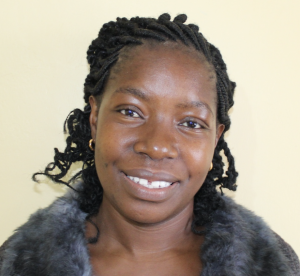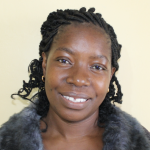The 498 students at Kamuluguywa Primary School most often collect water from a crowded, protected spring down a narrow, slippery, bushy path, but it is time-consuming and labor-intensive.

Students typically fetch water during their break and lunch, but they can not simply head to the water point, collect water and return to their activities. Community members also rely on the water source and forcefully make students wait to be last without regard to who was at the waterpoint first. Understandably frustration grows, and students end up arguing with community members and one another, grappling with being first so they can quickly return to school. But inevitably, students are still delayed and miss playtime and class time.
Some students skip the hassle of the protected spring altogether and collect water from wherever they can find it. Sadly, this means they are collecting water from contaminated open sources and delivering that unsafe water to the school, where everyone consumes it.
"We do not have any water source in the school compound, yet we need water daily for drinking, cooking, cleaning, and washing hands. Pupils have to walk for a long distance to go to the spring to get water. Pupils also have to pass through a busy road as they head to the waterpoint. They risk being hit by the motorbikes, and as a result, we have to accompany them to the spring and back to protect them from being hurt. All these affect the overall performance of both teachers and pupils negatively," said 39-year-old headteacher Eric Imbiakha, below by the unprotected spring students resort to using.

"The protected spring we go to fetch water from is shared with other community members who are our elders. That being the case, we have to wait for them to get water first before we do. When the queue is too long, especially during the dry season, we resort to going to the unprotected spring, whose water is visibly dirty. We get sick when we consume this water, but what choice do we have?" said 13-year-old Ferocious M. (shown below).

Stomach upsets are rampant among students and staff alike from drinking contaminated water. The school cannot maintain good hygiene standards since latrines are only partially cleaned and handwashing stations sit empty without water to refill them.
"The school tries as much as possible to get water for use, but with the high population of the school, water gets finished as soon as it is brought in. As a result, the hygiene conditions of the school are poor and pathetic," said our field officer Christine Masinde.

"Both pupils and staff get sick frequently because of consuming contaminated water that causes waterborne diseases like typhoid, bilharzia, and stomachache. Cases of absenteeism amongst pupils are high because of frequent illnesses," said Mr. Imbiakha.
Hopefully, with a safe water source on the school campus, the students and staff of Kamuluguywa will be able to focus on learning once again and regain some of their health.
What We Can Do:
New Well
We conducted a hydrogeological survey at this school and the results indicated the water table beneath it is an ideal candidate for a borehole well. Due to a borehole well's unique ability to tap into a safe, year-round water column, it will be poised to serve all of the water needs for this school's large population, even through the dry months.
The school will help collect the needed construction materials such as sand, rocks, and water for mixing cement. They will also provide housing and meals for the work team, in addition to providing local laborers. We will complement their materials by providing an expert team of artisans and drilling professionals, tools, hardware, and the hand-pump. Once finished, water from the well will then be used by the school's students and staff for drinking, handwashing, cooking, cleaning, and much more.
Handwashing Stations
The student health club will oversee the two new handwashing stations we will provide, and make sure they are kept clean and in working condition. The club leaders will fill the handwashing stations with water daily and make sure they are always supplied with a cleaning agent such as soap or ash.
VIP Latrines
We will construct two triple-door latrine blocks using local materials that the school will help gather. Three doors will serve the girls and three doors will serve the boys. All of these new latrines will have cement floors that are designed to be easy to use and to clean. And with a borehole right on school property, there should be enough water to keep them clean.
Training on Health, Hygiene, COVID-19, and More
We will hold a one-day intensive training session with students, teachers, and parents. This training will cover a wide range of topics including COVID-19 symptoms, transmission routes, and prevention; personal and environmental hygiene; and the operation and maintenance of the borehole, latrines, and handwashing stations. There will be a special emphasis on handwashing.
Our team of facilitators will use a variety of methods to train, including participatory hygiene and sanitation transformation, and asset-based community development. We will initiate a student health club, which will prepare students to lead other pupils into healthy habits at school and at home. We will also lead lectures, group discussions, and provide illustrative handouts to teach health topics and ways to promote good hygiene practices within the school including handwashing and water treatment. We will then conduct a series of follow-up trainings before transitioning to our regularly scheduled support visits throughout the year.
We and the school strongly believe that all of these components will work together to improve standards at this school, which will help lead to better student academic performance and will help unlock the opportunity for these students to live better, healthier lives.

 Borehole Well and Hand Pump
Borehole Well and Hand Pump
 Rehabilitation Project
Rehabilitation Project








































